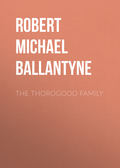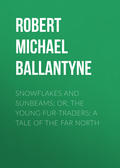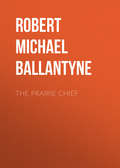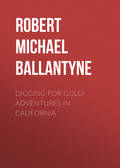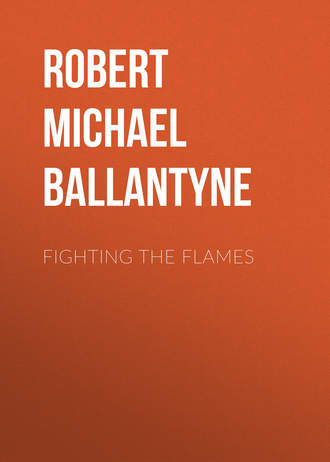
Robert Michael Ballantyne
Fighting the Flames
Chapter Sixteen
Willie in a New Light
Left alone with the fairy, Willie Willders began his duties as sick-nurse, a sphere of action into which he had never thought of being introduced, even in his wildest dreams.
He began by asking the fairy if she was all right and comfortable, to which she replied that she was not; upon which he explained that he meant, was she as right and comfortable as could be expected in the circumstances; could he do anything for her, in fact, or get her anything that would make her more comfortable than she was—but the fairy shook her poor head and said, “No.”
“Come now, won’t you have somethin’ to eat? What had you for dinner?” said Willie, in a cheery voice, looking round the room, but not discovering any symptoms of food beyond a few empty plates and cups (the latter without handles), and a tea-pot with half a spout.
“I had a little bread and butter,” said the fairy.
“No tipple?” inquired the nurse.
“No, except water.”
“Ain’t there none in the house?”
“No.”
“D’ye git nothin’ better at other times?” inquired Willie in surprise.
“Not often. Father is very poor. He was ill for a long time, too, and if it hadn’t been for your kind master I think we should all have starved. He’s better now, but he needs pretty good living to keep him up to his work—for there’s a deal of training to be done, and it wears him out if he don’t get meat. But the pantomimes began and we were getting on better, when the fire came and burnt everything we had almost, so we can’t afford much meat or beer, and I don’t like beer, so I’ve got them persuaded to let me live on bread and butter and water. I would like tea better, because it’s hot, but we can’t afford that.”
Here was a revelation! The fairy lived upon bread and butter and water! Willie thought that, but for the interpolation of the butter, it would have borne marvellous resemblance to prison fare.
“When had you dinner?” inquired Willie suddenly.
“I think about four o’clock.”
“An’ can’t you eat nothin’ now?”
Again the fairy shook her head.
“Nor drink?”
“Look if there’s anything in the tea-pot,” said the fairy.
Willie looked, shook his head, and said, “Not a drop.”
“Any leaves?”
“Why, y–yes,” he brought the pot nearer to the candle; “there are a few used-up ones.”
“Oh, do pour some hot water into it; but I fear the water is cold, and the fire’s too low to boil it, and I know the coals are done; but father gets paid his salary to-morrow, and he’ll give me some tea then. He’s very kind to me, father is, and so is Jim.”
She sighed as she spoke, and shut her eyes.
“Ziza,” said Willie in a careless tone, “you won’t object to my leavin’ you for a few minutes; only a few; I want to get a little fresh air, an’ see what sort of a night it is; I won’t be long gone.”
Ziza, so far from objecting, said that she was used to being left alone for long, long hours at a time, and wouldn’t mind it. So Willie put the candle nearer to her bedside, placed a tea-cup of water within reach, went out, shut the door softly behind him, groped his way through the passage and up the stair, and got into the street.
That day his eccentric employer had paid him his first month’s wage, a sovereign, with many complimentary remarks as to his usefulness. The golden coin lay in his pocket. It was the first he had ever earned. He had intended to go straight home and lay the shining piece in his mother’s lap, for Willie was a peculiar boy, and had some strange notions in regard to the destination of “first-fruits.” Where he had got them nobody could tell. Perhaps his mother knew, but nobody ever questioned her upon the point.
Taking this gold piece from his pocket, he ran into the nearest respectable street, and selected there the most respectable grocer’s shop, into which he entered, and demanded a pound of the shopman’s best tea, a pound of his best sugar, a pound of his best butter, a cut of his best bacon, and one of his best wax-candles. Willie knew nothing about relative proportion in regard to such things; he only knew that they were usually bought and consumed together.
The shopman looked at the little purchaser in surprise, but as Willie emphatically repeated his demands he gave him the required articles. On receiving the sovereign he looked twice at Willie, rung the piece of money three times on the counter, and then returned the change.
Gathering the packages in his arms, and putting the candle between his vest and bosom, he went into a baker’s shop, purchased a loaf, and returned to the “subterraneous grotto” laden like the bee. To say that the fairy was surprised when he displayed these things, would be a feeble use of language. She opened her large eyes until Willie begged her in alarm not to open them wider for fear they should come out, at which sally she laughed, and then, being weak, she cried.
After that she fell in with her nurse’s humour, and the two proceeded to “have a night of it.” Ziza said she’d be a real fairy and tell him what to do, and Willie said he’d be a gnome or a he-fairy and do it.
At the outset Willie discovered that he had forgotten coals, but this was rectified by another five minutes’ airing, and a rousing fire was quickly roaring in the chimney, while the kettle sang and spluttered on it like a sympathetic thing, as no doubt it was. Willie cleared the small table that stood at the invalid’s bed side, and arranged upon it the loaf, the tea-pot, two cracked tea-cups, the butter and sugar, and the wax-candle—which latter was stuck into a quart bottle in default of a better candle-stick.
“Now, ain’t that jolly?” said the nurse, sitting down and rubbing his hands.
“Very!” replied the patient, her eyes sparkling with delight.
“It’s so like a scene in a play,” continued Willie.
“Only much more real,” suggested the fairy.
“Now, then, Ziza, have a cup o’ tea, fresh from the market o’ Chiny, as your dad would say, if he was sellin’ it by auction. He’s a knowin’ codger your dad is, Ziza. There. I knowed I forgot somethin’ else—the cream!”
“I don’t mind it, indeed I don’t,” said Ziza earnestly.
Willie had started up to run out and rectify this omission, but on being assured that the fairy liked tea almost as well without as with cream, and that there was no cream to be got near at hand, he sat down again and continued to do the honours of the table. First he made the fairy sit up in bed, and commented sadly on her poor thin neck as she did it, observing that she was nothing better than a skeleton in a skin. Then he took off his own jacket and put it on her shoulders, tying the arms round her neck. Next he placed a piece of board in front of her, saying that it was a capital tray, and on this he arranged the viands neatly.
“Now, then, go at it, Ziza,” he said, when all was arranged.
Ziza, who received his attentions with looks that were wonderfully gleeful for one in her weak state of health, went at it with such vigour that the bread was eaten and the tea drunk in a few minutes, and the supply had to be renewed. When she was in the middle of her second round of buttered toast (for Willie had toasted the bread), she stopped suddenly.
“Why don’t you go on?” asked Willie.
“Because you have not eaten or drunk one mouthful yet.”
“But I’m lookin’ at you, and ain’t that better? Howsever, if ye won’t go on, I’ll not keep you back,” and with that Willie set to work, and, being uncommonly hungry, did what he styled “terrible execution among the wittles.”
For some time the nurse and patient ate in comparative silence, but by degrees they began to talk, and as they became more confidential their talk became more personal.
“D’you like bein’ a fairy?” said Willie, after a lull in the conversation.
“No, I don’t,” replied Ziza.
“Why not?”
“Because—because—I don’t like the kind of things we have to do, and—and—in short, I don’t like it at all, and I often pray God to deliver me from it.”
“That’s strange, now,” said Willie, “I would have thought it great fun to be a fairy. I’d rather be a little clown or a he-fairy myself, now, than anything else I know of, except a fireman.”
“A fireman, Willie?”
“Yes, a fireman. My brother, Blaz—a—Frank, I mean, is one, and he saved the lives of some people not long since.”
Of course Willie here diverged into a graphic account of the fire in Beverly Square, and, seeing that Ziza listened with intense earnestness, he dilated upon every point, and went with special minuteness into the doings of Frank.
When he concluded, Ziza heaved a very deep sigh and closed her eyes.
“I’ve tired you, Ziza,” exclaimed Willie, jumping up, with a look of anxiety, and removing the tea-board and jacket, as the child slipped down under the clothes. He asked if she wanted to go to sleep.
“Yes, for I’m very tired,” she sighed languidly; then added, “but please read to me a little first.”
“What book am I to read you?” said Willie, looking round the room, where no book of any kind was to be seen.
“Here, it’s under the pillow.”
Willie put his hand under the pillow and pulled out a small pocket-Bible.
“Read the third chapter of Saint John’s Gospel,” said the child, closing her eyes.
Willie read in the monotonous tones of a schoolboy’s voice until he came to the sixteenth verse, “For God so loved the world, that He gave His only begotten Son, that whosoever believeth in Him should not perish, but have everlasting life.”
“Stop at that verse,” whispered Ziza. “I’ll go to sleep now.”
Her deep breathing soon proclaimed that she was in the land of dreams, so Willie removed the candle a little further away from her, and then, resting his elbows on the table and his head in his hands, began to read the Bible. He turned over a few pages without much intention of finding any particular place, for he was beginning to feel sleepy.
The first words his eyes fell upon were, “Blessed are they that consider the poor.”
He roused up a little at this, and read the verse again, for he connected it with the fact that the fairy was poor. Then he pondered it for some time, and, falling asleep, dropt his head on the Bible with such force that he woke up for a little and tried to read again, but do what he would he could not get beyond that verse; finally he gave up the attempt, and, laying his forehead down upon it, quickly fell sound asleep.
In this state the couple were discovered an hour or two later by Messrs Cattley senior and junior on their return from the theatre.
“Inscrutable mysteries! say, what is this?” exclaimed the elder clown, advancing into the room on tiptoe.
Apostrophising his eye and one Betty Martin, the younger clown said that it was a “rare go and no mistake,” whereupon his father laid his hand on Willie’s shoulder and gently shook him.
“Eh! another cup, Ziza?” exclaimed the self-accused nurse, as he put out his hand to seize the tea-pot. “Hallo! I thought it was the fairy,” he added, looking up with a sleepy smile; “I do believe I’ve gone and fell asleep.”
“Why, lad, where got ye all those things?” inquired the senior Cattley, laying aside his cloak and cap, and speaking in a low tone, for Ziza was still sleeping soundly.
“Well, I got ’em,” replied Willie in a meditative tone, “from a friend of mine—a very partikler friend o’ mine—as declines to let me mention his name, so you’ll have to be satisfied with the wittles and without the name of the wirtuous giver. P’r’aps it was a dook, or a squire, or a archbishop as did it. Anyway his name warn’t Walker. See now, you’ve bin an’ woke up the fairy.”
The sick child moved as he spoke, but it was only to turn, without awaking, on her side.
“Well, lad,” said the clown, sitting down and looking wistfully in the face of his daughter, “you’ve got your own reasons for not tellin’ me—mayhap I’ve a pretty good guess—anyhow I say God bless him, for I do b’lieve he’s saved the child’s life. I’ve not seen her sleep like that for weeks. Look at her, Jim; ain’t she like her old self?”
“Yes, father, she don’t need no paint and flour to make a fairy on her just now. She’s just like what she was the last time I seed her go up in a gauze cloud to heaven, with red and blue fire blazin’ all round her.”
“I’ll bid ye good-night now,” said Willie, buttoning up his jacket to the chin, and pulling his cap down on his brows with the air of a man who has a long walk before him.
“You’re off, are you—eh?” said the elder clown, rising and taking Willie by the hand, “well, you’re a good lad. Thank’ee for comin’ here an’ takin’ care of Ziza. My subterranean grotto ain’t much to boast of, but such as it is you’re welcome to it at all times. Good-night.”
“Good-night,” said Willie; “good-night, Jim.” Jim replied good-night heartily, and then Willie stepped into the dark passage. He glanced back at the fairy before shutting the door, but her eyes were closed, so he said good-night to her in his heart, and went home.
Chapter Seventeen
Home Life
“My dear Miss Tippet, I shall never, no never, get over it.”
So said, and so undoubtedly thought, a thin little old lady with remarkably bright eyes, and a sweet old face, as she sat sipping tea at Miss Tippet’s elbow.
It was in the drawing-room of Miss Deemas that she sat, and the Eagle sat opposite to her.
“It was very dreadful,” responded Miss Tippet with a sigh—“very.”
“It was awful. I know I shall never get over it,—never,” repeated the little old lady, finishing her tea, and asking for another cup in the calmest possible voice, with the sweetest possible smile.
“Oh yes, you will, Mrs Denman,” said Miss Deemas snappishly.
“No, indeed, I won’t,” repeated Mrs Denman; “how can I? Just think of the situation. Sitting in my chair in dishabille, when a man—a Man, Miss Dee—”
“Well, I know what a man is,” said the Eagle bitterly; “why don’t you go on?”
“Burst himself through my bedroom-door,” continued Mrs Denman, “with lime and charcoal and brick-dust and water streaming down his face—f–fo-olded me in his arms, bore me out into the street—the street! Oh! I shall never, never get over it; and so little, so very little clothing on me—”
“How much had you on?” asked Miss Deemas in a deep voice, the calmness of which contrasted forcibly with Mrs Denman’s excited tones.
“Really, Miss Deemas, I see no necessity for going into particulars. It is sufficient to know that I was carried by a man into the street in the face of some thousands of people, for I heard them cheering though I saw them not. I know I shall never get over it—another cup, my love; not quite so much sugar—no, not if I were to live to the age of Methusaleh.”
“I don’t wonder, indeed I don’t,” murmured the sympathetic Miss Tippet. “I think, Julia dear, you are a little too hard on Mrs Denman. How would you like to have been carried out of a burning house in such a way by a big rough man?”
“Oh, my dear,” interposed Mrs Denman, “I did not say he was rough. Big he certainly was, and strong, but I must do him the justice to say that the man li—lif—oh me! lifted me up very tenderly, and carried me as though I had been an infant and he my mother, through smoke and fire and water, into the street, before the eyes of the—whole—oh, it’s too awful to think of!”
“Stuff!” ejaculated Miss Deemas, pecking a piece of cake out of her fingers as she would, metaphorically of course, have pecked the eyes out of the head of Frank Willders, or any other man. “Didn’t you say he put a blanket round you?”
“Of course, Miss Deemas; I should have died otherwise of pure shame.”
“No, you wouldn’t,” retorted the Eagle. “You would probably have been half suffocated and a good deal dirtied, and you might have been singed, but you wouldn’t have died; and what need you care now, for the people saw nothing but a bundle. You might have been a bundle of old clothes for all they knew or cared. All they wanted to see was the bravery, as they call it, of the man; as if there were not hundreds upon hundreds of women who would do the same thing if their muscles were strong enough, and occasion served.”
“But it was a brave act, you know,” said Miss Tippet timidly.
“I don’t know that,” retorted Miss Deemas, helping herself to more cake with as much decision of manner as if she had been carrying it off by force of arms from before the very muzzles of a masculine battery. “I don’t know that. He had to escape, you know, for his own life, and he might as well bring a bundle along with him as not.”
“Yes; but then,” said Miss Tippet, “he first went up the—the thingumy, you know.”
“No, he didn’t,” retorted Miss Deemas smartly; “he was in the house at the time, and only came down the ‘thingumy,’ as you call it!”
It was a peculiarity of Miss Deemas’s character, that she claimed the right to be as rude as she chose to people in her own house, and rather prided herself on this evidence of independence.
“In my opinion,” said Mrs Denman, “his being in the burning house at all of his own accord, was of itself evidence of courage. I think the fireman is a brave young man.”
Thus much Mrs Denman said with dignity to Miss Deemas. The remainder of her speech she addressed to Miss Tippet.
“But, my dear, I feel that although I owe this young man a debt of gratitude which I can never repay, I shall never be able to look my preserver in the face. I know that his mind will always revert, when he sees me, to the fi—fig—the figure that he lifted out of that easy-chair. But there is one thing I have resolved on,” continued the little old lady in more cheerful tones, as she asked for another cup of tea, “and that is, to get a fireman to instruct me as to the best method of saving my own life should fire again break out in my dwelling.”
The Eagle gave a hysterical chuckle at this.
“I have already written to one who has been recommended to me as a shrewd man, and he is coming to call on me this very evening at seven o’clock.”
Mrs Denman started, as if her own remark had recalled something, and pulled out her watch.
“Why, it is almost half-past six!” she exclaimed, rising hastily. “Excuse a hurried departure, Miss Deemas. Your society and sympathy” (she looked pointedly at Miss Tippet here) “have been so agreeable that I did not observe how time was flying. Good-bye, Miss Deemas. Good evening, dear Miss Tippet.”
Miss Deemas bowed.
“Good-bye, my love,” said Miss Tippet, bustling round her friend. “I’m so glad to have met you, and I hope you’ll come and see me soon; 6 Poor-thing Lane, remember. Come whenever you please, dear Mrs Denman. Yes, yes, time does indeed fly, as you say; or as my friend, Sir Archibald What’s-his-name used to remark, ‘Tempit fugus something re-what’s-’is-name.’ Good-bye, dear Mrs Denman.”
While the ladies were thus engaged, one whom the Eagle would have tossed her beak at with supreme contempt was enjoying himself in the bosom of his family. This was none other than Joe Corney himself, who, having received a “stop” for a distant fire, had looked in on his wife to tell her of the note he had received from Mrs Denman.
The family bosom resided in a small portion of a small house in the small street where the fire-engine dwelt.
Joe had laid his helmet on the table, and, having flung himself into a chair, seized his youngest child, a little girl, in his arms, raised her high above his head and laughed in her face; at which the child chuckled and crowed to the best of its ability.
Meanwhile his eldest son, Joe junior, immediately donned the helmet, seized the poker, thrust the head of it into a bucket of water, and, pointing the other end at a supposed fire, began to work an imaginary hand-pump with all his might.
“It’s goin’ out, daddy,” cried the urchin.
“Sure, he’s a true chip o’ the owld block,” observed his mother, who was preparing the evening meal of the family; “he’s uncommon fond o’ fire an’ wather.”
“Molly, my dear,” said the fireman, “I’d have ye kape a sharp eye on that same chip, else his fondness for fire may lead to more wather than ye’d wish for.”
“I’ve bin thinkin’ that same meself, honey,” replied Mrs Corney, placing a pile of buttered toast on the table. “Shure didn’t I kitch him puttin’ a match to the straw bed the other day! Me only consolation is that ivery wan in the house knows how to use the hand-pump. Ah, then, ye won’t believe it, Joe, but I catched the baby at it this mornin’, no later, an’ she’d have got it to work, I do believe, av she hadn’t tumbled right over into the bucket, an’ all but drownded herself. But, you know, the station’s not far off, if the house did git alight. Shure ye might run the hose from the ingin to here without so much as drawin’ her out o’ the shed. Now, then, Joe, tay’s ready, so fall to.”
Joe did fall to with the appetite of a man who knows what it is to toil hard, late and early. Joe junior laid aside the helmet and poker, and did his duty at the viands like the true son of a fireman—not to say an Irishman—and for five minutes or so the family enjoyed themselves in silence. After that Joe senior heaved a sigh, and said that it would be about time for him to go and see the old lady.
“What can it be she wants?” asked Mrs Corney.
“Don’t know,” replied her husband. “All I know is that she’s the old lady as was bundled neck and crop out o’ the first-floor windy o’ the house in Holborn by Frank Willders. She’s a quare owld woman that. She’s got two houses, no less; wan over the coachmaker’s shop—the shop bein’ her property—an’ wan in Russell Square. They say she’s rich enough to line her coffin with goold an inch thick. Spakin’ o’ that, Molly my dear, a quare thing happened to me the other night. It’s what ye call a coinsidence.”
“What’s that, Joe?”
“Well, t’ain’t easy to explain, but it means two things happenin’ together in a most onlikely way—d’ye see?”
“No, I don’t, Joe,” replied Mrs Corney, helping herself to another slice of toast.
“Well, it don’t matter much,” resumed Joe, “but this is what it was: Mr Dale an’ me was sittin’, about two in the mornin’, at the station fire smokin’ our pipes (for it was my turn on duty) an’ chattin’ away about one thing an’ another, when somehow we got upon tellin’ our experiences, an’ Dale he tells me a story o’ how he was once called to a fire in a cemetary, an’ had to go down among the coffins—for they was afire—an’ what a fright some o’ his men got, when, just as he had finished, an’ all my flesh was creepin’ at wot I’d heard, there comes a ring at the bell an’ a call to a fire in Portland Street. I runs an’ gets out the ingin, an’ Frank (he was my mate that night) he rings up the boys, an’ away we wint in tin minutes. It wasn’t far, an’ when we got there in we wint into the house, which was full o’ smoke, but no fire to be seen. We wint coughin’ and sneezin’ an’ rubbin’ our eyes down into a cellar, where the lads of another ingin was at work before us wi’ the hand-pumps, an’, would ye belaive it? but the walls o’ that cellar was lined wi’ coffins! True for ye, there they was, all sizes, as thick as they could stand. I thought I was dramin’, but it was no drame, for it was an undertaker’s shop; an’ when I wint upstairs, after we diskivered the fire an’ put it out, I sees two coffins on tressels lyin’ ready for use. Wan was black-painted wood, no doubt for a poor man, an’ nothin’ inside o’t. The other alongside was covered wid superfine black cloth an’ silver-mounted handles, an’ name-plate, an’ it was all padded inside an’ lined wid white satin!”
“White satin, Joe? You’re jokin’.”
“As sure as your name’s Molly, it was white satin,” repeated Joe; “I wouldn’t have belaived it av I hadn’t seen it; but that’s the way the quality goes to their graves. I looks at the two coffins as I was comin’ away, an’ thinks I to myself, I wonder whether the poor man or the rich man’ll be most comfortable when they’re laid there?”
“Now, Molly, I’ll bid ye good-night an’ be off to see this owld lady, this Mrs Denman. Look afther that boy, now, an kape the matches out of his way, whativer ye do.”
With this very needful warning, Joe Corney kissed his wife and the baby, and went off to the station to obtain leave of absence for a couple of hours.



